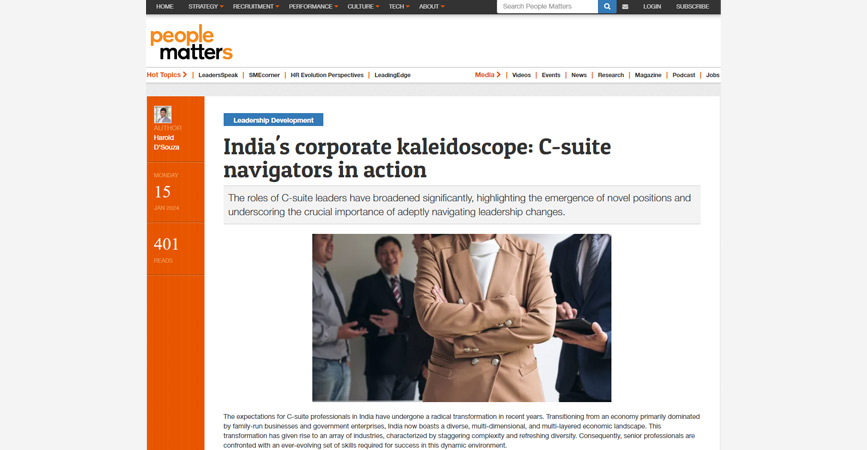
The roles of C-suite leaders have broadened significantly, highlighting the emergence of novel positions and underscoring the crucial importance of adeptly navigating leadership changes.
The expectations for C-suite professionals in India have undergone a radical transformation in recent years. Transitioning from an economy primarily dominated by family-run businesses and government enterprises, India now boasts a diverse, multi-dimensional, and multi-layered economic landscape. This transformation has given rise to an array of industries, characterized by staggering complexity and refreshing diversity. Consequently, senior professionals are confronted with an ever-evolving set of skills required for success in this dynamic environment.
Not only have the roles of C-suite professionals expanded in scope and impact, but novel positions continue to emerge regularly. This constant evolution necessitates a distinct set of expectations for C-suite leaders, highlighting the crucial role of navigating leadership changes and dynamics. Success in this dynamic environment hinges on the ability to adapt and lead effectively, differentiating between triumph and failure.
Leadership evolution in the tech industry
In the ever-evolving landscape of various industries, the very essence of leadership undergoes a transformative shift, significantly impacting operational dynamics. The tech industry, for example, has witnessed a seismic change in what defines effective leadership today compared to the time of managing teams in IT services or BPO. Within the dynamic and intricate startup environment, a leader’s role extends beyond navigating evolving technology and meeting customer expectations; it now encompasses adeptly managing the distinct values and lifestyle drivers of the GenZ workforce.
Leaders find themselves often enrolled in a crash course to master the art of people management within startups, where conventional notions of loyalty and long-term commitment have become outdated. In this sphere, experience isn’t synonymous with tenure but is defined by the diverse array of experiences gained while working in the exhilarating startup milieu. Leaders falling short of these evolving demands risk losing their ability to inspire, motivate, and effectively lead their teams.
Conversely, in the social media-driven world, leadership in today’s Indian economy involves another crucial facet: managing a company’s image and presence. A leader’s persona is frequently intertwined with the company’s, making the constant management of this aspect an essential dynamic of leadership. A stray comment or misplaced opinion can significantly impact the fortunes of both the company and the leader, underscoring the importance of vigilant image management in the contemporary business landscape.
Challenges of leadership in a growing economy
In the evolving economy, traditional company structures are rapidly transforming. The role of a CIO extends beyond IT management to handling intricate complexities, even overseeing the customer experience function. Likewise, HR heads are no longer mere people managers but guardians of the company’s people brand. Moreover, CEOs are not solely business leaders; they now embody the company’s ethos and represent the industry sector.
In the changed economy, which is now growing at a faster pace than every other economy in the world the challenges of leadership transcend to –
Technology – Leaders must stay abreast of the ever-evolving tech landscape and guide their teams to optimize technology use efficiently.
People management – The essence, approach, and content of people management, a vital leadership skill, are evolving. While the fundamentals remain consistent, the workforce’s expectations in this economy lean towards short-term commitments, amid heightened competition.
Social media and image, brand, and persona – Navigating this realm is an emerging skill crucial for leadership success. Effectively managing influencers, marketers, and platforms is essential.
Evolving company structures – As the economy experiences rapid growth, organizational, reporting, and communication structures are in flux. Leaders must adeptly choose and guide the right structures for success.
Social and environmental responsibility – Leadership involves a responsibility to be socially aware, environmentally conscious, and considerate of the climate. Striking a balance between growth and sustainability is a complex challenge in today’s Indian economy.
Uniquely Indian national dynamics – Our country’s distinctive and nonlinear dynamics play a crucial role in global perceptions. How leaders manage their businesses and communicate impacts how every small step is perceived globally, making effective navigation vital.
The role of the new leader therefore is far far more complex.
Leadership is no more command and control, it is very often convince and persuade. It is very often data over everything. And it is no more closed doors and hierarchy but open offices and access. Leaders who are open to the fast-changing nature of doing business and working with people across levels are the only ones who will succeed.
Source: People Matters








